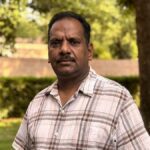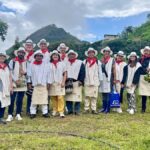
From Receiving Training in Generosity to Replicating It in Christian Communities
May 29, 2025
From One Heart to a National Harvest: Orden Colombia, Palmful of Coffee, and GTP
June 24, 2025Connecting faith and environmental stewardship
ABOUT THIS EPISODE
In the forty-fifth episode of the Inspiring Stewards podcast, Nathan Jones speaks with Ronald Blonk from the Netherlands. Ronald, founder of Let's Go, leads a ministry that develops curriculum for children, combining biblical teaching, environmental care, and sustainable farming practices. He shares how God called him to serve as a fundraiser and later inspired him to create a curriculum that empower children, especially in under-resourced communities. Ronald underscores the importance of stewardship, urging listeners to embrace their role in caring for both people and the environment. He closes with a powerful reminder: actions speak louder than words in advancing God's kingdom.
We’d love to hear your thoughts, comments, or feedback. To do so, email us at mail@gtp.org.
The music is Concerto a’ 4 Violini No 2 by Telemann played on classical guitar by Jon Sayles. Published by Exzel Music.
Length: 10:53
TRANSCRIPT
NATHAN JONES
This month, we head for the first time to the Netherlands to hear from Ronald Blonk, founder of Let's Go, a ministry focused on creating children's curriculum that teaches both the Bible and sustainable farming methods.
I'm your host, Nathan Jones, and thank you once again for joining us on this episode of the Inspiring Stewards podcast.
Ronald, thanks again for your time today. Looking forward to this conversation, especially to get to know more and more of your story. So this is good, but let's jump in. Give us a little bit of your background, where you're from, who you are, that sort of thing.
RONALD BLONK
I'm born and raised in the Netherlands. I studied in Rotterdam, Erasmus University, International Marketing. Currently, I’m 55 years old, 27 years married to Ina, and we have five children.
NATHAN
Wow, congratulations!
RONALD
One of them is a foster child. And when I was 22, I took a decision for Christ, and that was life changing. From that moment on, I had to tell the whole world about the gospel, about Jesus.
So, I was getting active in the church and a student association, and I was organizing all kinds of events everywhere.
Then, entering the secular world, I was working for a couple of companies. And after 10 years, God was calling me to be a fundraiser for Agape in the Netherlands, which is a part of Campus Crusade (Cru).
But in 2014, the Lord was pointing me, He was calling me to do a new assignment, and I will share about that later.
NATHAN
I appreciate the fostering aspect of your story. We also have four children, one is a foster kiddo. And what a gospel-centered calling! So, praise the Lord for how He's led you in that direction. Well, give us an overview of what the Lord has you involved with today.
RONALD
Yeah, since 2014, I'm leading Let's Go Children Ministry. It's a Sunday school curriculum we built. It's a six-year curriculum with a strong focus on stewardship. Every lesson we developed has to be applicable in the lives of the children today.
Besides the spiritual lessons, we also develop vegetable garden lessons and we made these lessons sustainable gardening.
And when we went to Africa and to Asia with the curriculum, we contextualized it to the rural area situation. And we developed a special gardening system, which is based on Foundations for Farming, which is already known and working for 40 years with the poorest farmers in Africa.
So, we changed the curriculum because the children we want to reach, many of them are illiterate, and they are almost all children of farmers. So, that's where we have our focus. And they are the poorest people on the earth, measured in dollars, but it doesn't mean they are not able to serve in God's kingdom.
So, we help them to teach that God has a high calling for them, so that they will be proud farmers and serve Him in their ways, and He will make them fruitful.
So, we started implementing this curriculum in countries like India, Cameroon, Mozambique, South Africa, and this year, we hope to start in Kenya and Malawi. So, that’s great.
NATHAN
Wow. What kind of impact are you seeing on the individual lives of kids and families that are taking what you've taught and applying? How is that impacting their story?
RONALD
We see an immediate impact as soon as the children start the vegetable gardening. We teach them as they have fruits, harvest to share from that. And we want them to look with God's eyes who needs these fruits, and they start giving it to the needy people in their community.
And we see the churches where the children start this curriculum, that the adults directly get jealous, and they want to do it themselves, you know.
They think, "Wow, why didn't we do that?" you know, and they start their own vegetable garden also to share with needy people. So, that's one of the most visible fruits we see directly.
NATHAN
As I was looking at your website and some of your work, what struck me is the creative ways that you're able to get more production out of the land. And as I think about as individuals living with the stewardship mindset, that's part of it, is how can we be smarter with what we've been entrusted. So, could you share one or two of the ways that you are better stewarding the land and able to produce more of a crop, and maybe it's just a couple of the highlights of your approach to farming. I thought that was very interesting.
RONALD
We teach the children that everything we need is already available, only you have to start looking with God's eyes to what is given to you.
So, if you do farming, the world is teaching you, you need all kinds of things to buy, for example, synthetic fertilizers, very special seeds for example, pesticides to they say, protect your crops. And we teach them that everything is already available for free when you start looking.
So, we teach them to compost. So, to do composting, we teach them to collect manure, to collect leaves, to collect grass, to collect the ingredients to make compost, which is much more fertile than synthetic fertilizers. Because they are not only there for let the crop grow, but they are really feeding the soil, and the compost is regenerating the soil. And it's regenerating the soil life.
And the other thing is we teach them to plant trees. Instead of cutting them, we say, no, we plant trees, we take care, and we teach them why are trees so important, because they prevent erosion, the rain erosion, the wind erosion. They are keeping the soil moist. And it's like in Psalm 1, where we are planted, we are like the trees, and the veins, the roots of the tree have access to the water that will bear fruits.
And that's what's happening. If you plant a tree, it's taking care for the environment, and it's good for your crops, but it's also bearing fruits at the moment when the hungry season starts.
NATHAN
We've talked about stewardship in the context of Let's Go as an organization, and what you're able to teach. Give us a little bit of insight in how the role of stewardship has played out in your life, personally.
RONALD
What happened when I was studying in 2010-2014 the Bible on stewardship principles, and I discovered there that God has a lot to say about stewardship. But it was in many times 100% opposite to what I thought what is stewardship. Because in the worldly way, stewarding, it's very similar to exploiting something, you know, producing, words like producing, etc.
But I discovered that God, when He talks about stewardship, He is really talking constantly about conservation, about sustainability principles, about protecting what is weak, and etc. And I discovered that my view was completely different.
So, I tried to make the most out of the money I've got. So, what I was doing, I was buying the cheapest meat. I was buying the cheapest vegetables. So, I was very good in that.
But when I saw that, I had to confess to the Lord, to ask for forgiveness. And we as a family, we started to buy all kinds of organic food, organic clothing. I changed my car so that I could drive on renewable fuel.
We switched our bank and insurance to green investment companies. We started to give gifts to foundations who fight against big spoilers and government who is doing not the right kind of regulations.
So, with every dollar we spend, we make a choice to proclaim good stewardship. And that's a big change. So, we changed from – we were already 100% serving in God's kingdom, but our spending was 100% in a worldly way, and we brought this one to in line.
NATHAN
Well, that's very good. Thank you for sharing. Okay, let's take a step back as we're getting close to wrapping up, and just share with me how you're seeing God at work in the world today, unique in history, whether it's local specific geography or more at large around the world. How are you seeing God at work today?
RONALD
I have to think two things. And one of them is the people of Israel, how they are still here, and they are a witness of God's faithfulness. The other one is the body of Christ, His Church. You know, it's growing, it's having a positive impact in this world. And that's a miracle, you know, because if you follow history, it's not logical. Both are not logical and they are still here.
Because the rules of God are opposite to the law of the strongest will survive. The Lord is the opposite message, and that we have to protect the weak, we have to take care for the weak, and especially this group who is taking care for the weak and etc, it is still there and that's fantastic.
NATHAN
That is fascinating to think about. Well, Ronald, as we're wrapping up, any final thoughts that you want to leave those listening with today?
RONALD
What came to my mind is what we do is more important than what we say.
NATHAN
That is a good, a good word, and you live it. Thank you, Ronald, for your time. This has been tremendous.
RONALD
Thank you.




